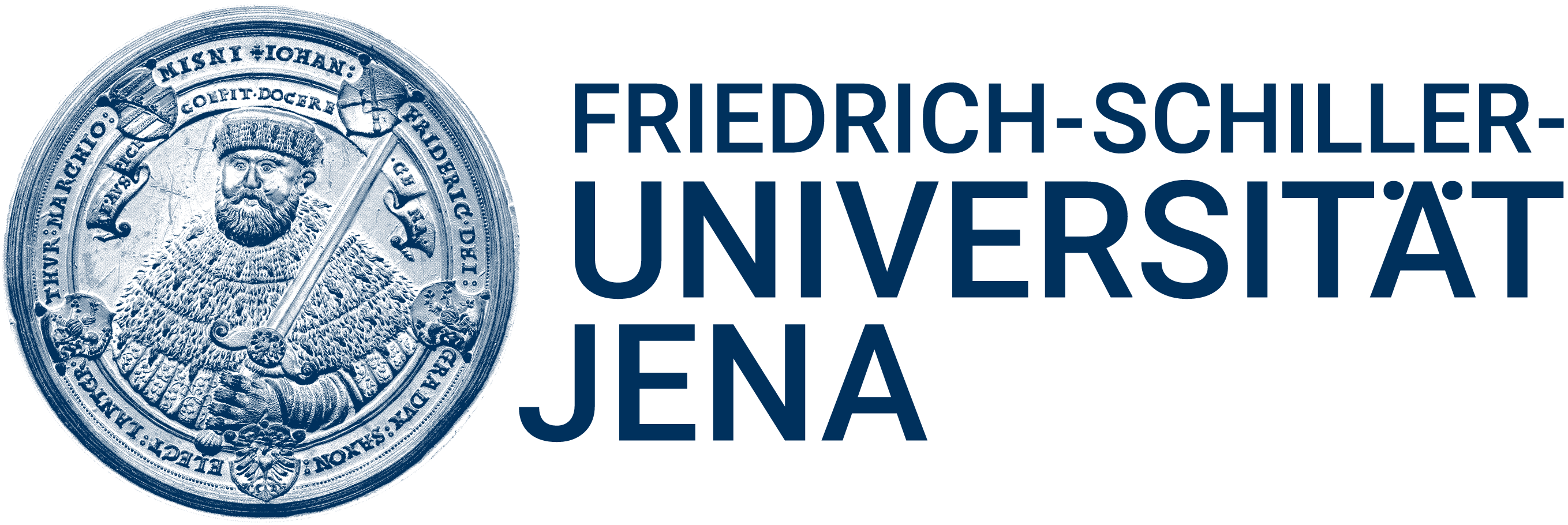Job advertisement
Vacancy ID: 181/2025
Closing date: 2025-09-15


The Friedrich Schiller University Jena is a dynamic and innovation-driven university centrally located in Germany. With a broad range of disciplines, it shapes the future through excellent research and teaching. Its scientific excellence is reflected in the profile areas Light – Life – Liberty, which provide pioneering insights and sustainable solutions for the society of tomorrow. Through close collaborations with leading research institutions, innovative companies, and renowned cultural organizations, it advances interdisciplinary developments. With around 17,000 students and approximately 10,000 employees, it defines Jena as a vibrant, internationally connected city of science and innovation.
The Cluster of Excellence “Imaginamics: Practices and Dynamics of Social Imagining” is offering two full-time (100% / 40 hours per week) positions as
Head of a Junior Research Group
to commence on 01.01.2026 for a fixed term expiring on 31.12.2031. We aim to turn this into a permanent position.
The Cluster of Excellence “Imaginamics” is an interdisciplinary research project of the Friedrich Schiller University Jena that conducts research on the practices and dynamics of social imagining. Funded by the German Excellence Strategy, it brings together scholars from multiple departments. The Cluster’s work distinguishes itself from extant research on social imaginaries by focusing on processes, practices, and dynamics of social imagining. For more information, see https://www.uni-jena.de/imaginamics.
“Imaginamics” is organized in three Research Areas that center on different fields of inquiry:
- Research Area 1 “Imagining Difference” studies practices and dynamics of imagining difference, including social, religious, ethnic, and gender difference. Scholars will analyze the relevance of social imagining for the production, reproduction, and critique of difference as well as the relation between “doing difference” and “imagining difference.”
- Research Area 2 “Imagining Crises and Temporalities” studies practices and dynamics of imagining time and temporality in the context of social, political, economic, and environmental crises, including topics like the historicity of temporal experiences or the (global) distribution of narrative, visual, and sensory imaginaries.
- Research Area 3 “(Re)Imagining Democracy” studies how practices and dynamics of imagining condition the emergence of new political ideas, forms of political praxis, political identities, and visions of the future. It also engages with topics like the political dynamics of social networks, contemporary crises of democracy, and the transformation of ideas and practices of democracy.
A total of two positions are being advertised. Assignment to one of the Research Areas will depend on the thematic focus of the application.
Your responsibilities:
- Make an innovative contribution to the Cluster’s research and its strategic development by conducting research in one of the three Research Areas.
- Lead an independent research group and supervise the dissertations of two doctoral students.
- Publish your research findings in journals and books with an international readership (e.g. peer-reviewed).
- Conceive and organize conferences and other events.
Your profile:
- Doctoral degree in the social sciences or humanities with an excellent grade, ideally on a topic directly related to the Cluster’s research.
- An innovative, well-structured research project proposal that advances empirical and/or theoretical knowledge about the Cluster’s field of inquiry.
- Interest in interdisciplinary collaboration and further scholarly qualification.
We offer:
- Remuneration based on the provisions of the Collective Agreement for the Public Sector of the Federal States (TV-L) at a salary scale E15 — depending on the candidate’s personal qualifications — including a special annual payment.
- Opportunity to collaborate on a wide range of highly interdisciplinary empirical and theoretical research.
- Support for continuing education and professional development.
- A family-friendly working environment with a variety of offers for families, including the University Family Office (JUniFamilie) and flexible childcare (JUniKinder).
- Attractive benefits such as retirement accounts (VL) and an occupational pension (VBL).
The University of Jena has received multiple awards for its diversity, equity, and inclusion efforts and its family-friendly work environment. The university seeks to employ more women, first-generation college graduates, people with a history of migration, and people of eastern German background. Severely disabled applicants with equivalent qualifications will be given preferential consideration.
We welcome applications for projects that are related to the Research Areas and that address specific problems in their respective field of research while also engaging with transdisciplinary connections. If this sounds like you, please submit the following application materials (as PDF via our online form):
- A brief outline of the research program you propose for your Junior Research Group (4–6 pages),
- List of publications,
- Your dissertation and two articles or book chapters,
- Curriculum vitae,
- university transcripts.
Please note which Research Area(s) you would be interested in working in.
Interviews will take place in person in Jena in October or November 2025. Unfortunately, the university cannot reimburse expenses incurred for travel to the interview.
Interested? Apply by 15.09.2025 using our online form.
If you have questions at any time during the application process, please write us an e-mail with the identifier number 181/2025 in the subject line: claudia.schroth@uni-jena.de.